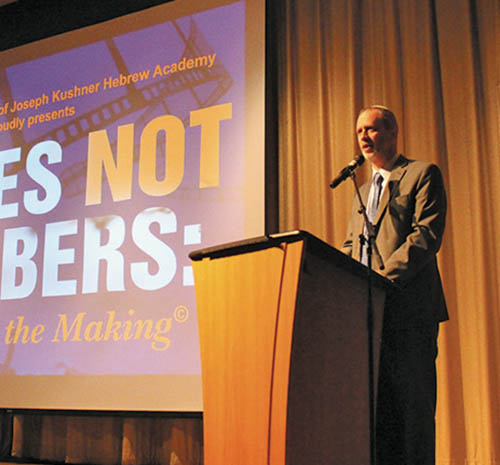




The eighth grade students at the Joseph Kushner Hebrew Academy have, of course, been taught about the Holocaust—from their teachers, parents, family members, books and movies. None of those could have fully prepared them for what they learned this past year as they participated in the school’s third ‘Names, Not Numbers’ program. Through the year-long experience, the students were given the opportunity to interview and film Holocaust survivors, hearing their stories firsthand and recording them for posterity. The movie that resulted from their interviews was screened on Wednesday, June 1, to a packed auditorium of students, survivors, family members, faculty and community members.
As Debbie Finkelstein, JKHA principal and co-producer of the film, stated, “‘Names, Not Numbers’ educates in a manner that teachers and books cannot accomplish.”
Her words, taken from the book Night by Elie Wiesel and echoed by Rabbi Eliezer Rubin, Head of School, and Tova Fish-Rosenberg, project creator, made the importance of this education eerily clear: “The survivors are sharing memories that will soon be lost. Your generation is the last one that will have the opportunity to hear the firsthand stories.”
Over the course of the past year, the eighth graders were divided into groups and each group was assigned a Holocaust survivor. The students were mentored by Wall Street Journal reporter, and published author, Gregory Zuckerman regarding the best practices for conducting an engaging interview. Each survivor was given a set of questions at the outset, to provide the students with background information. After receiving the responses, each group spent time researching its survivor’s personal history, becoming immersed in the details of his or her story in order to develop appropriate interview questions and fully prepare for the interviews. Members of each group filmed the interview themselves, after receiving instruction on filming techniques for a documentary from filmmaker Mikaela Floom. The students remembered being told to aim the camera directly into the faces of the interviewee, since it would otherwise look to the viewer as if the survivor was staring off into space, rather than looking into the camera.
The students participating in ‘Names, Not Numbers’ also visited the Museum of Jewish Heritage in New York City as part of the program and had sessions with Rabbi Dovid Sukenik, mashgiach ruchani, at JKHA on emunah (faith).
“To look at other people’s heroism and learn from it…if there are really people like [the survivors], there must be a God,” noted Sukenik.
After spending time editing down the one-hour interviews to approximately 15 minutes of footage, the students had their finished product. The edited stories of the eight survivors, along with a chronicle of the students’ journey in making these oral histories, was screened at the school as a professionally produced documentary entitled ‘Names, Not Numbers’: A Movie in the Making: JKHA 2015-16. Many of the survivors—Millie Zuckerman, Theodore Halpern, Lea Jakubovic, Ed Mosberg, Marlene Stevens, Rene Szarfarc, Isadore Dresdner and Nathan Kasdan—or representatives from their families, were in attendance and the students were able to present them with a copy of the documentary, all of their interview footage and a gift of appreciation at the conclusion of the program. In many cases, these items were presented along with a few tears and huge hugs, as students and survivors shared a moment of bonding forged during the interview process.
“It was an incredibly powerful experience to go through the process with these students,” commented Finkelstein. “To experience these survivors’ stories through the eyes of 13 and 14 year olds—the same age that many of the survivors were during the Holocaust—was moving, and I couldn’t be prouder of these students for the level of respect that they showed the survivors. They truly understood and embodied the importance of the program.”
The students often had difficulty editing down the interviews as they felt that everything the survivors said had value. The survivors’ stories traversed countries throughout Europe and eventually the US, and their experiences included the horrors of the concentration camps, grueling work of labor camps, hiding in the woods, the fears of being hidden in the care of righteous gentiles and the anguish of leaving one’s family behind.
As survivor Ed Mosberg powerfully told the students, “I survived. I’m here and I can tell you these stories.”
Fish-Rosenberg said, “The Torah tells us to become aware of what occurred in days gone by. Zachor/remembering is more than just knowing what happened.” She continued, “History is what happened. Memory are the stories that are part of who we are.”
The students definitely took those words to heart, as expressed during the last moments of the film as they reflected on what they had learned and how the experience had impacted them.
“Never lose faith in your religion,” said one student.
“Be good American citizens and good to your Jewish faith,” noted another.
“Rely on Hashem.”
“Never forget what happened.”
“Never give up.”
“Always remember, what happens to you is for a reason.”
“Never be ashamed of your identity as a Jew.”
“Pass down the stories.”
“Love and support Israel.”
The survivors echoed that last sentiment, noting that there is no better “revenge” and comfort for the pain they endured than to see the State of Israel survive and prosper.
Rabbi Rubin concluded with a message spoken directly to the students. “It is your responsibility to speak the truth to those who will deny the Holocaust. [The survivors’] legacies are now your memories.”
In recognition of the fact that the passage of time has resulted in the remaining survivors telling stories of the Holocaust as seen through their eyes as children, this film was dedicated to those who cannot tell their stories—the children who perished in the Holocaust.
By Jill Kirsch










